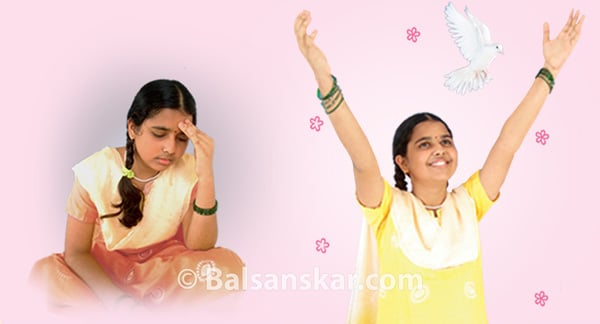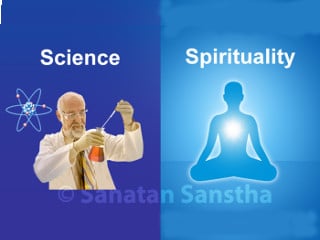Most people experience the truth of what Tukaram Maharaj has said – ‘Happiness seems as minute as a grain of barley, while unhappiness seems as huge as a mountain’. In an average person’s life, happiness is 25% and unhappiness is 75%. Since most people do not know how to attain Anand, (Bliss) each one tries to acquire atleast temporary happiness through the five senses, mind and intellect; for example eating a favourite dish. Similarly, we make efforts to overcome unhappiness, for example, taking medicines during illness, getting the TV set repaired when it breaks down etc. Let us understand what is Happiness and Unhappiness, its importance and how to overcome unhappiness completely.
1. Definitions of Happiness and unhappiness
-
सर्वेषाम्अनुकूलतयावेदनीयंसुखम् ।
सर्वेषांप्रतिकूलतयावेदनीयंदुःखम् । – Tarkasangraha, Kārika 55, 56Meaning : Happiness is a pleasant sensation, and unhappiness is an unpleasant sensation experienced by the embodied soul through the five senses, mind and / or intellect.
-
यदिष्टंतत्सुखंप्राहुःद्वेष्यंदुःखमिहेष्यते ।। – Pārāshargītā, Adhyāya 6, Shloka 27
Meaning : In this world what one feels as favourable is happiness and whatever one feels like despising is unhappiness.
-
यद्यत्प्रियंयस्यसुखंतदाहुःतदेवदुःखंप्रवदन्त्यनिष्टम् । – Mahābhārat, Shāntiparva, Adhyāya 194, Shloka 10
Meaning : One regards what is dear to oneself as happiness and the same thing when it is disliked, as unhappiness.
-
बाधनालक्षणंदुःखम् । – Nyāyasutra, Adhyāya 1, Ānhik 1, Sutra 21
Meaning : Bādhanā (yeeOevee) means pain. That which has the form of pain is unhappiness.
-
‘अधर्मजन्यंसचेतसांप्रतिकूलम्’ means that which arises from adharma (Unrighteousness) and proves to be unfavourable for living beings is itself unhappiness. – Bhāshāparichhēda
-
Although initially it is necessary for sense organs to have contact with external objects for generation of worldly happiness and unhappiness, man experiences them with his mind. Spiritual happiness or sorrow is always psychological. Finally, the experiencing of all happiness or unhappiness is dependent solely on the mind; hence, it is not impossible to restrain the experiences of happiness and unhappiness with the mind. It is with this very opinion that Manu has described the features of happiness and unhappiness differently from those following Nyāyashāstra (A system of philosophy founded by Sage Gautam), as –
सर्वंपरवशंदुःखंसर्वमात्मवशंसुखम् ।
एतद्विद्यात्समासेन लक्षणंसुखदुःखयोः ।। – Manusmruti, Adhyāya 4, Shloka 160Meaning : All that which is in the control of external objects is unhappiness,while that which is in the control of one’s mind is happiness. This is the concise feature of happiness and unhappiness.
2. Importance
The basic sensations of happiness and unhappiness are very important to survive and gain fundamental knowledge. Even anamoeba moves away if there is any undue particle in its vicinity as it finds it unpleasant, and goes where it feels comfortable, that is, towards food particles. An infant too, reaches upto the mother’s breast to taste her milk. A young child runs away from fire and withdraws its foot on being pricked by a thorn. From this, we realise that all actions of any organism are motivated by a desire to obtain happiness or to escape from unhappiness or an unpleasant event.
A. Happiness is helpful; but unhappiness is a teacher
Though happiness is helpful, yet it can trick man into remaining in Māyā (Great Illusion). Happiness teaches how to swim through the sea of life; whereas, unhappiness teaches the art of diving into the ocean of life and obtaining the pearl in the Principle form and provides strength. For example, when a poor person loses his job, he has to spend his life on the small balance left with him. Hence, he can live his life with thriftiness. Hence, a quality of God of being thrifty, that which is a great Principle is imbibed by him in his attitude. Also, while trying to create a path through the difficulties of life, his mind becomes stronger. Thus, the intellect to understand life and the strength to live life is obtained through unhappiness.
B. Getting happiness after enduring unhappiness
-
Why is a girl ready to bear the unhappiness of getting the earlobe and the nose pierced? To get the happiness of wearing the ornaments.
-
A mother gets the happiness of begetting a child after going through the agonies of delivery.
-
Why did Saint Tukārām Mahārāj undergo the unhappiness of being in the womb ? Because, after getting the unhappiness of being in the womb, he would get the happiness of getting a human life. Here, the meaning of happiness is that, it is only in human life that one can dedicate himself in the service of God and love Him.
- Only after performing incredibly difficult task can one attain Brahman (God in His aspect as the Creator of the universe).
C. God is remembered due to unhappiness
Kunti says, “O God, you have kept us in unhappiness. With every passing day, bigger and bigger mountains of unhappiness descend on us; but even in that state whenever we gave a heart-rending call to you, you appeared and resolved our unhappiness. Look at other devotees; they are always in a happy state. Despite this whenever they call you, you appear before them. You are not partial. You shower your love equally on all; but there is a difference in our faith. The devotees who are in a state of happiness are superior to us; because, during the state of happiness also their chanting remains uninterrupted. So you keep them happy.
We are also your devotees; but you keep us unhappy so that our chanting of your Name will continue uninterruptedly. Since the people do not realise this secret of your grace, they are unhappy and they blame you and hold you responsible for their unhappiness. Sincethey incur the sin of blaming you, they are not liberated from the cycleof birth-death and become increasingly unhappy. O God, no matter how much we pray to you for happiness under the influence of Māyā, do not keep us happy. Keep us unhappy always, because we remember you in a state of unhappiness. We are unable to call you intensely unless we are tormented by unhappiness. I consider the happiness which makes me forget you as unhappiness and consider the unhappiness which makes me remember you as happiness.”
Seekers should read the above paragraph with the perspective of understanding the importance of unhappiness. Seekers should not ask for unhappiness or happiness from God. They should look at the happiness-unhappiness coming in life as per their destiny with sākshībhāv (Spiritual emotion of being in an observer state) and perform sādhanā (Spiritual practice). However, ask God for enough strength to bear the unhappiness.
3. Types of happiness and unhappiness
A. When alive and after death
1. When alive
According to the scriptures, Ādhibhoutik (Physical), Ādhidaivik (Divine) and Ādhyātmik (Spiritual) are the types. These types are classified according to the cause of happiness or unhappiness. We will understand this better with an example, that of the sun.
-
Ādhibhoutik : The sun being the form of radiance, it has tremendous amount of heat. The warm sunlight feels pleasant in winter, but the same is distressful during summer. Thus, happiness or unhappiness experienced from various objects created from the Panchamahābhūta (Five great cosmic elements) is termed as Ādhibhoutik. Happiness and unhappiness from fire, drought, excessive rainfall, so also from animals and man are included in this type.
-
Ādhidaivik : Deity Savitā regulates all activities of the sun. This Deity is appeased by and blesses the one who chants Her Name. Hence, such happiness is termed as Ādhidaivik. However, should this Deity gets enraged, it curses the person who consequently has to experience unhappiness. In short, happiness and unhappiness arising from the grace of Deities or their rage, those from ghosts, spirits etc. unhappiness experienced after death are included in this category.
-
Ādhyātmik :
-
Physical : Due to an imbalance of vāta (Wind), pitta (Bile) and kapha (Phelgm).
-
Psychological : Due to the Shadaripū (The six foes), namely, kām (desire), krodh (anger), lobh (greed), mada (vanity), moha (attachment) and matsar (jealousy). These defects too are dependent on vāta, pitta and kapha.
-
To overcome unhappiness arising from Ādhibhoutik and Ādhidaivik causes, generally external measures need to be employed. Thus, this unhappiness is curable with external remedies. On the other hand, for curing psychological unhappiness, internal measures need to be employed.
2. After death
One experiences unhappiness on not obtaining objects which gave happiness when alive.
B. Relativity
-
Related to unhappiness : One feels happy after recovering from an illness. If one who is unhappy due to ignorance is enlightened with knowledge the unhappiness vanishes; this can be called happiness related to unhappiness.
-
Related to happiness : When a well-to-do person procures a huge fortune, he feels happy. If the reverse happens, one gets unhappiness related to happiness and unhappiness.
4. Types of happiness
-
Sāttvik: Giving happiness to others without thinking about one’s own happiness or suffering. Giving happiness to others does not reduce one’s own happiness; this is in reality being 100% happy. This happiness arises out of the mind.
-
Rājasik: Trying to acquire happiness without causing any unhappiness to others. Happiness obtained from the sense organs and the motor organs is termed as Rājasik happiness; for example, eating some delicacy. In this case, happiness or contentment is obtained instantly, but ultimately it culminates into unhappiness for the reasons given ahead.
-
One cannot experience a lot of happiness; for example, one can get a stomach upset by over-eating a sweet dish.
-
One cannot obtain the objects the moment they are desired; for example, the sweet shop may be closed or a particular sweet may not be available in the shop.
-
Sometimes it so happens that the happiness gets converted into a necessity; for example, after enjoying travelling by car it becomes a habit. Thereafter, if the car is unavailable for even a day, one feels unhappy.
-
-
Tāmasik: One derives happiness by making others unhappy and running away from the hardships of life; for example, drinking alcohol, consuming narcotics etc.
Generally, happiness experienced by the intellect is sāttvik, that by the mind is rājasik and that by the body is tāmasik in nature. Happiness derived after the intellect acquires spiritual knowledge is merely due to the elimination of ignorance which is gross in nature. When the mind experiences happiness, its grossness too decreases.
5. Overcoming unhappiness completely
If we do not want to be unhappy, we have to go beyond happiness and unhappiness. Unhappiness does not vanish by denying its existence and joy does not come by merely wishing for it. Hence, it is best not to think of happiness and unhappiness.
The state beyond happiness and unhappiness is called the ‘balanced state of mind’. In this state, a person experiences neither happiness nor unhappiness based on worldly objects. That is, the person does not become happy with joy and is neither distressed with unhappiness; on the contrary, he is engrossed in experiencing Ātmānand (Bliss from self-realisation).
Ānand is eternal and of supreme quality. The science which teaches us how to acquire Ānand is termed as the science of Spirituality. Hence, it is said that
‘सुखंनविनाधर्माततस्मातधर्मपरोभवेत् ।’
meaning, ‘we can attain Ānand only if we are Dharmaparāyaṇ (Follower of Dharma [Righteousness]);
Hence, we should be Dharmaparāyani. If we hold on to Spirituality and try to obtain Ānand by performing sādhanā, then we also get the benefit of happiness in this world as well as in the other world. Once one realises this at an intellectual level, one begins undertaking sādhanā.
Reference: Sanstha’s Holy Text on ‘Introduction to Spirituality‘ and ‘Spirituality‘



 Physical sciences and the science of Spirituality
Physical sciences and the science of Spirituality Obstacles faced when studying Spirituality
Obstacles faced when studying Spirituality Importance of Spirituality
Importance of Spirituality Misconceptions about Spiritual practice ( Sadhana )
Misconceptions about Spiritual practice ( Sadhana ) Qualities essential for Spiritual practice ( Sadhana )
Qualities essential for Spiritual practice ( Sadhana )